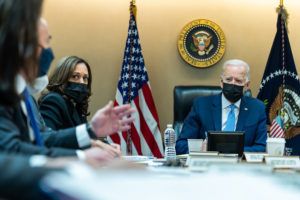
President Joe Biden and Vice President Kamala Harris meet with their National Security team on the situation in Afghanistan, Tuesday, Aug. 31, 2021, in the White House Situation Room. (Official White House Photo by Adam Schultz
In their recent rhetoric, Joe Biden and Kamala Harris are increasingly casting Americans as terrorists and enemies. Harris’s January 6 speech was loaded with such dreck. Gerard Butler wonders if the White House duo are simply being dramatic, or if they actually believe what they’re saying.
Are Americans as Bad as the Axis Powers, or Islamic Terrorists?
Baker explores the idea that the Biden/Harris team really believe that Americans are the enemy, writing in the Wall Street Journal:
So when Vice President Kamala Harris suggests, as she did last week, a sort of equivalence between last year’s Capitol riot on the one hand and Pearl Harbor and 9/11 on the other, we might give her the benefit of the doubt and put it down to a characteristic combination of historical ignorance, cheap rhetorical excess and hyperpartisan overreach. With the Biden administration’s political woes intensifying in an election year, the identification of the domestic opposition as a seditious enemy may be their last, best hope of salvaging something.
But there’s another, more intriguing possibility. What if she and the administration she works for actually believe their own narrative that they are engaged in an existential, twilight struggle against the forces of darkness among us. That those forces are as menacing to the American way of life as were the Axis powers and Islamist terrorists? What if the military leaders who have been steeping themselves in the modern-day canon of progressive thought see the threat of white supremacist ideology, domestic far-right extremism and the revanchism of the Trumpists as the principal clear and present danger to national security?
To ask this is not necessarily to mock or even challenge the idea that the U.S. has profound domestic divisions, or to deny that some in the country reject the basic elements of the compact necessary to keep a democracy from violently disintegrating.
But it’s legitimate to ask what this means for the administration’s larger conception of national security. How does the perceived need to focus on domestic threats affect the objectives of America’s global strategy? No one would say it’s impossible to confront domestic threats and external challenges at the same time. But this administration claims to face a greater threat from domestic enemies than any in the past 150 years. The most important question: How does the rest of the world—especially America’s adversaries—hear the Biden-Harris message, and what calculations do they make as a result?
The World Sees Biden’s Unfocused Weakness
While Biden is tilting at “domestic terrorist” windmills here in America, Baker suggests antagonistic autocrats around the globe are taking advantage of his lack of focus.
Mr. Biden seems to think that triumphing over his domestic enemies is itself the primary condition for assuring the success of America’s interests in the world. Rallying the leaders of 100 countries at his Summit for Democracy last month, he called the struggle “the defining challenge of our time” and said that democracy was in retreat in the U.S. too.
He may ultimately prove right. At minimum we can say that America will have trouble pursuing its interests if it is hobbled by bitterly divisive domestic politics.
But in the meantime autocrats aren’t easily persuaded by rallying cries for democratic renewal. They’re more impressed by the realpolitik of diplomacy and strategic decision-making, and for now they’re seizing their chances.
In Europe, the Middle East and Asia, the early steps of the Biden administration seem—to friends and potential foes alike—to reflect the distraction from the threat at home.
Diplomats in the countries of these regions speak—in public and even more emphatically in private—of a world in which America has retreated to the sidelines.
Biden Doesn’t Think America Is Worth Defending
Biden and his progressive allies aren’t interested in defending freedom in America because they don’t believe it’s worth defending. Baker concludes:
But he does lead a party many of whose activists don’t seem to think America’s traditional values are worth defending at home or abroad. And when his administration elevates (or reduces) its domestic opponents to the status of a foreign enemy, the only winners are the real foreign enemies.
If you’re willing to fight for Main Street America, click here to sign up for the Richardcyoung.com free weekly email.





